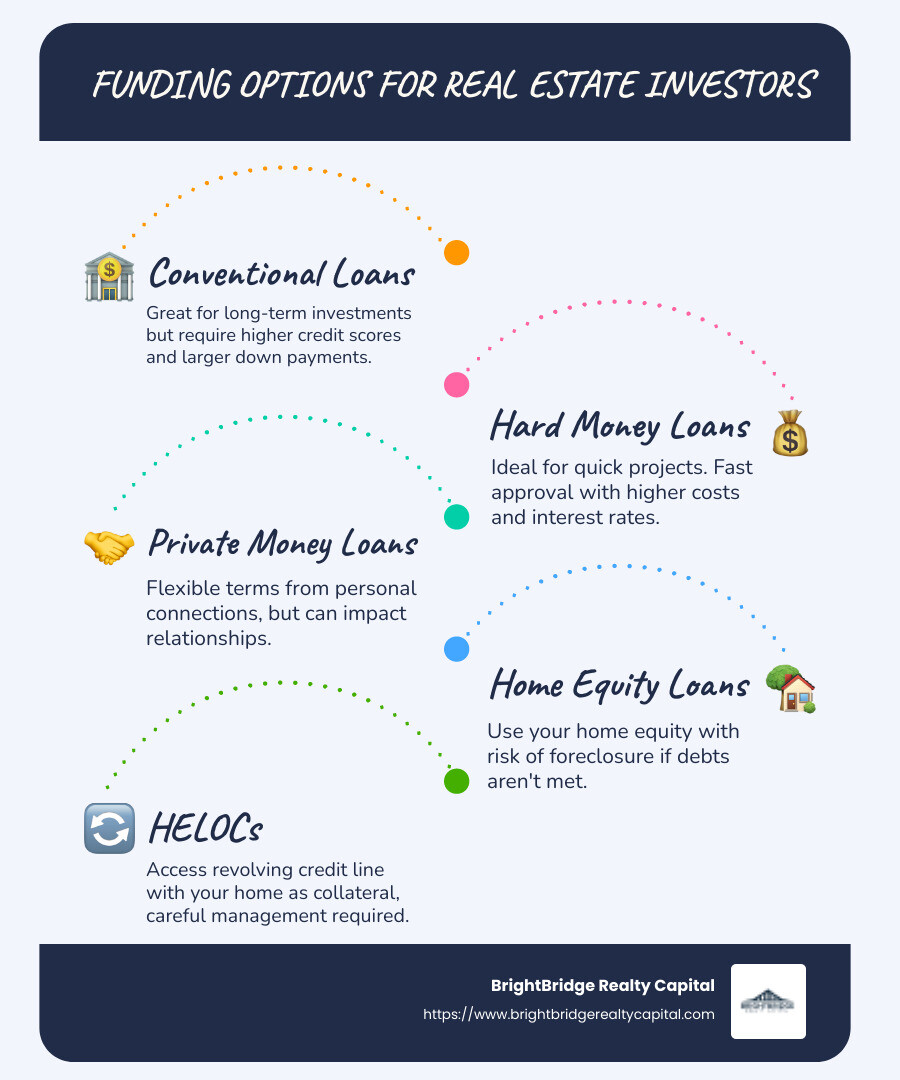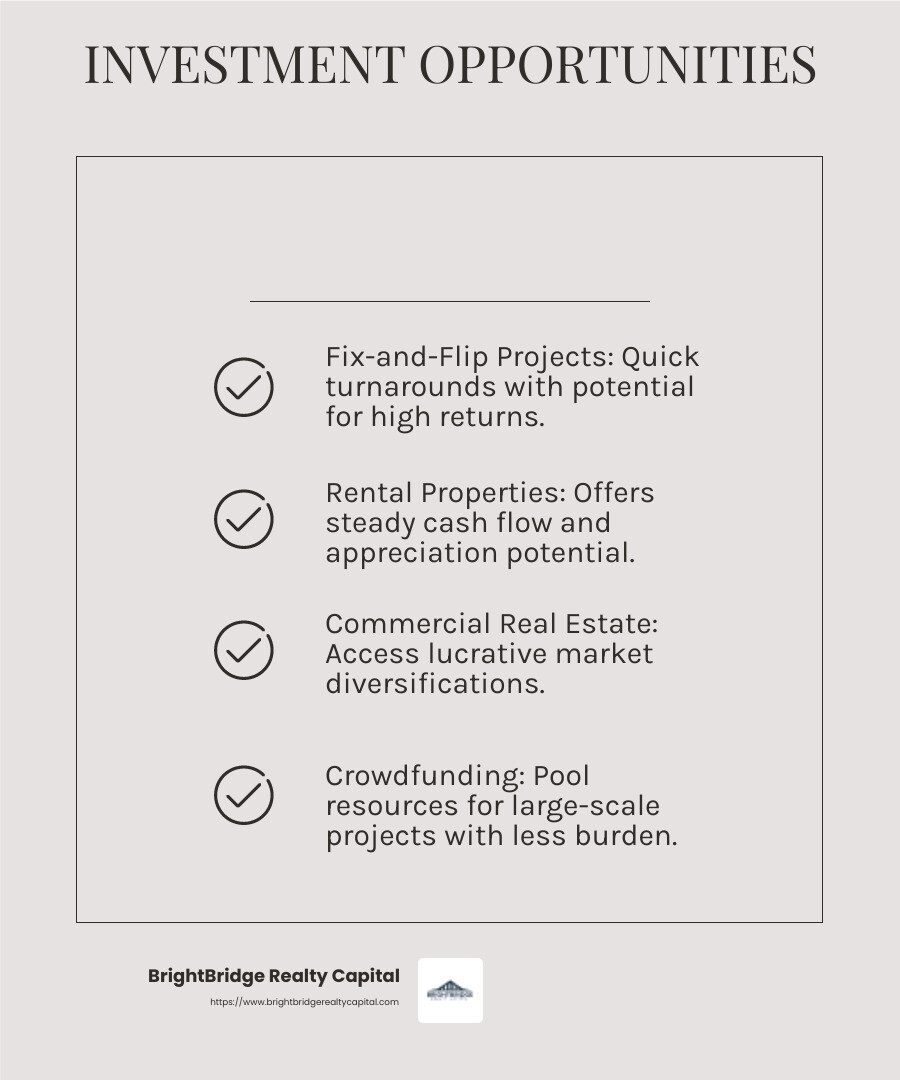Unlocking Capital: How to Secure Funding for Real Estate Investors

Funding for real estate investors is a critical step toward open uping the full potential of your property portfolio. Whether you're diving into fix-and-flip projects or expanding a rental portfolio, securing efficient and affordable funding is essential.
Here's a quick snapshot of funding options for real estate investors:
- Conventional Loans: For long-term investments, but require higher credit scores and down payments.
- Hard Money Loans: Ideal for short-term projects, offering quick approvals but at higher costs.
- Private Money Loans: Flexible terms, often from acquaintances, but can strain relationships.
- Home Equity Loans and HELOCs: Leverage existing home equity with the risk of foreclosure.
Real estate is a time-tested asset class, offering diversification, steady cash flow, and property appreciation over time. When done right, financing an investment property can improve your returns significantly through leverage. However, investment property financing carries more stringent criteria and requires careful planning.
Let's explore how you can steer through various financing options to find the right solution for your investment needs.

Important funding for real estate investors terms:
Understanding Real Estate Financing Options
When it comes to funding for real estate investors, understanding the various financing options is crucial. Real estate financing isn't just about securing money; it's about finding the right type of loan that aligns with your investment goals and financial situation.
Higher Down Payments and Stricter Credit Requirements
Investment properties are seen as higher risk by lenders. This means you'll often face higher down payment requirements compared to primary residences. While a typical mortgage for a primary home might require a 20% down payment, investment properties can demand 25% or more. This ensures that lenders have a buffer in case of default.
Credit requirements are also more stringent. Lenders prefer borrowers with higher credit scores, often around 620 or higher, to offset the perceived risk of default. This can be challenging for new investors, but it's a crucial step in securing financing.
Types of Real Estate Financing
Understanding the types of real estate financing can help you choose the best option for your needs. Here's a quick rundown:
Conventional Mortgages: These are the most common and are ideal for long-term investments. They require higher credit scores and down payments, but offer stability and predictable terms.
Hard Money Loans: These are short-term loans often used for fix-and-flip projects. They come with higher interest rates but offer quick approval times, which can be crucial in competitive markets.
Private Money Loans: These are loans from private individuals or groups. They offer flexibility but can be risky if personal relationships are involved.
Home Equity Loans and HELOCs: These allow you to leverage the equity in your existing home. While they offer lower interest rates, they come with the risk of foreclosure if you can't keep up with payments.

Navigating the Financing Landscape
Each financing option has its pros and cons. It's essential to assess your financial situation, investment goals, and risk tolerance to choose the right path. For instance, if you're planning a long-term buy-and-hold strategy, a conventional mortgage might suit you best. On the other hand, if you're looking to quickly buy and sell properties, hard money loans could be more appropriate.
Understanding these options and their requirements can help you make informed decisions, ensuring your real estate investment journey is both profitable and sustainable.
Next, we'll dig into innovative real estate funding solutions that are reshaping the landscape for modern investors.
Funding for Real Estate Investors
Securing funding for real estate investors can be a challenging yet rewarding endeavor. Understanding the right financing options is key to maximizing your investment potential. Let's explore some popular methods: bridge loans, hard money loans, and property investments.
Bridge Loans: Short-Term Solutions for Long-Term Gains
Bridge loans are short-term financing options designed to "bridge" the gap between the purchase of a new property and the sale of an existing one. These loans are ideal for investors needing immediate capital to seize a promising real estate opportunity.
Quick Access to Funds: Bridge loans provide fast funding, often within a week. This speed can be crucial in competitive markets where timing is everything.
Flexible Terms: These loans offer flexible repayment terms, allowing investors to tailor the loan to their specific needs.
Higher Interest Rates: While convenient, bridge loans come with higher interest rates. They are best suited for investors confident in their ability to quickly sell or refinance the property.
Hard Money Loans: Fast and Flexible Financing
Hard money loans are another popular choice for real estate investors, especially those involved in fix-and-flip projects. These loans are provided by private lenders rather than traditional banks.
Less Stringent Requirements: Unlike conventional loans, hard money loans have looser qualifying criteria, making them accessible even to those with lower credit scores.
Short-Term Commitment: Typically lasting one to two years, these loans are perfect for short-term investments.
Higher Costs: The convenience of hard money loans comes at a price. They generally have higher interest rates and require a significant down payment or personal collateral.
Property Investment: Building Wealth Over Time
Investing in property remains a tried-and-true method for building long-term wealth. With the right financing, investors can leverage their capital to acquire valuable real estate assets.
Steady Cash Flow: Rental properties can provide a consistent revenue stream, helping offset mortgage payments and other expenses.
Appreciation Potential: Real estate historically appreciates over time, offering investors the potential for significant returns.
Tax Benefits: Property investments come with various tax advantages, such as deductions on mortgage interest, depreciation, and maintenance costs.
Understanding these financing options empowers investors to make informed decisions. By selecting the right funding method, you can open up new opportunities and grow your real estate portfolio effectively.
Next, we'll explore innovative real estate funding solutions that leverage technology and creative financing to meet the needs of modern investors.
Innovative Real Estate Funding Solutions
In today's market, traditional funding methods might not always meet the needs of real estate investors. Fortunately, there are innovative real estate funding solutions that offer alternative options, often leveraging technology to provide new opportunities.
Alternative Funding Methods
Seller Financing: This is where the property seller acts as the lender. The buyer makes payments directly to the seller. This method can speed up transactions and offer flexibility, especially for those who might not qualify for traditional loans. However, it's important to be aware of the risks, such as potential buyer default and higher legal costs.
Crowdfunding and Syndicates: By pooling resources from multiple investors, crowdfunding allows participation in larger real estate projects with less individual financial burden. Syndicates can provide diversification and access to substantial properties, but they come with complex management structures and regulatory requirements. These methods are best suited for experienced investors.
Online Platforms
The rise of technology has brought about online platforms that simplify the process of securing real estate funding. These platforms connect investors with various funding opportunities, often providing a more streamlined and efficient process compared to traditional methods.
Quick Access and Transparency: Online platforms offer quick access to funding options and provide transparency in terms of fees and processes.
Diverse Opportunities: Investors can explore a wide range of investment opportunities, from residential properties to commercial real estate, all from the comfort of their home.
User-Friendly Interfaces: These platforms are designed to be intuitive and easy to steer, making it simpler for investors to find and secure the funding they need.
Investment Opportunities
Innovative funding solutions open doors to a variety of investment opportunities. By utilizing these methods, investors can explore:
Fix-and-Flip Projects: Quick turnarounds and potential for high returns make these projects attractive. Innovative funding solutions can provide the necessary capital to get started.
Rental Properties: With steady cash flow and appreciation potential, rental properties remain a popular choice. Alternative funding methods can make acquiring these properties more accessible.
Commercial Real Estate: For those looking to diversify, commercial properties offer unique opportunities. Innovative funding solutions can help investors tap into this lucrative market.

By exploring these innovative real estate funding solutions, investors can find the right fit for their needs and expand their portfolios in exciting new ways. Next, we'll dig into government and third-party grants that can further support your real estate investment journey.
Government and Third-Party Grants
Exploring funding for real estate investors isn't just about loans and private investments. Grants, both from government and third-party sources, can provide valuable support without the obligation of repayment. Let's explore the types of grants available.
Federal Grants
The U.S. government offers various grants aimed at boosting housing development and community revitalization. While not directly available for individual real estate investments, these grants often support broader projects that can benefit investors indirectly.
Community Development Block Grants (CDBG): These are provided by the Department of Housing and Urban Development (HUD) to local governments. They focus on affordable housing and economic development. Real estate investors can partner with local agencies to tap into these funds.
HOME Investment Partnerships Program: Also managed by HUD, this program helps create affordable housing for low-income families. Investors involved in such projects can benefit from the subsidies provided.
State Grants
State governments often have grant programs custom to their specific housing and economic needs. These grants can be a great resource for investors looking to participate in state-sponsored development projects.
State Housing Finance Agencies (HFAs): Many states have HFAs that provide grants and low-interest loans to support housing projects. These agencies often collaborate with private investors on affordable housing initiatives.
Economic Development Grants: Some states offer grants to encourage development in underdeveloped areas. Real estate investors focusing on revitalizing these regions can benefit from such programs.
Third-Party Grants
Non-governmental organizations and private foundations also provide grants that can assist real estate investors, particularly those focusing on social impact or community development.
Nonprofit Organizations: Groups like Habitat for Humanity often partner with investors to develop housing projects for low-income families. While these partnerships may not always involve direct grants, they often include valuable resources and support.
Corporate Foundations: Some corporations have foundations that offer grants for community development projects. Investors with a focus on social responsibility can leverage these grants to fund impactful projects.
By understanding and utilizing these government and third-party grants, real estate investors can access additional funding sources that align with broader community goals. Up next, we'll answer some frequently asked questions about real estate funding to help you steer this complex landscape.
Frequently Asked Questions about Real Estate Funding
What are the best ways to secure funding for real estate investments?
Securing funding for real estate investors involves exploring a variety of options. Here are some of the most effective ways:
Hard Money Loans: These are short-term loans from private lenders, often used for quick funding. They have higher interest rates but are easier and faster to obtain compared to traditional loans.
Microloans: Ideal for new businesses, microloans offer smaller loan amounts with less stringent qualification requirements. They can be a good fit if you need a modest amount to get started.
Real Estate Crowdfunding: Platforms allow investors to pool their money to fund real estate projects. This option is accessible to both accredited and non-accredited investors, offering a way to diversify investments with lower capital.
SBA Loans: Backed by the Small Business Administration, these loans are available through banks and come with a government guarantee, making lenders more willing to take risks.
Each option has its pros and cons, so it's crucial to assess your financial situation and investment goals before choosing the right funding method.
How do bridge loans work for real estate investors?
Bridge loans are short-term loans used to "bridge" the gap between buying a new property and selling an existing one. Here's how they work:
Quick Access: Bridge loans provide immediate cash flow, allowing investors to seize opportunities without waiting for their current property to sell.
Short Terms: Typically, these loans have a term of six months to a year, giving investors time to complete transactions or renovations.
Collateral Required: Lenders usually require the property being sold as collateral, which can be risky if the sale doesn't go through as planned.
Bridge loans are valuable for investors who need fast funding but come with higher interest rates. It's important to have a solid exit strategy to repay the loan quickly.
Are there free government grants available for real estate investing?
While direct grants for individual real estate investments are rare, there are opportunities to access funding through broader programs:
Federal and State Grants: Programs like the Community Development Block Grants (CDBG) and HOME Investment Partnerships Program support housing and economic development. Investors can partner with local agencies to benefit indirectly from these funds.
Third-Party Grants: Nonprofits and corporate foundations sometimes offer grants for projects with social impact. Real estate investors focusing on community development can leverage these grants.
These grants often require collaboration with local governments or nonprofit organizations and may not be directly accessible for individual investment projects. However, they can provide valuable support for community-focused initiatives.
Understanding the nuances of these funding options can help investors steer the real estate landscape more effectively. Next, we'll explore innovative funding solutions that leverage technology and online platforms.
Conclusion
In the world of real estate, having quick and reliable access to capital is crucial. That's where BrightBridge Realty Capital shines. We specialize in providing fast closings and direct lending solutions custom to meet the unique needs of real estate investors.
Speed and Efficiency
Our ability to close deals often within a week sets us apart. This speed is vital for investors looking to seize opportunities quickly. Whether you're venturing into fix-and-flip projects, ground-up construction, or expanding a rental portfolio, our streamlined process ensures you get the funding you need without unnecessary delays.
Direct Lending Advantage
By cutting out intermediaries, we offer competitive rates and a seamless experience. This direct approach not only saves time but often results in better terms for borrowers. Our nationwide reach means we can assist you no matter where your investment properties are located.
Custom Solutions
At BrightBridge Realty Capital, we understand that every investor's strategy is unique. That's why we offer customized loan options designed to fit your specific goals and needs. Our expert team is dedicated to guiding you through the entire process, from application to final payoff.
Ready to open up capital and accelerate your real estate ambitions? Explore our loan options and find how we can support your investment journey today.


